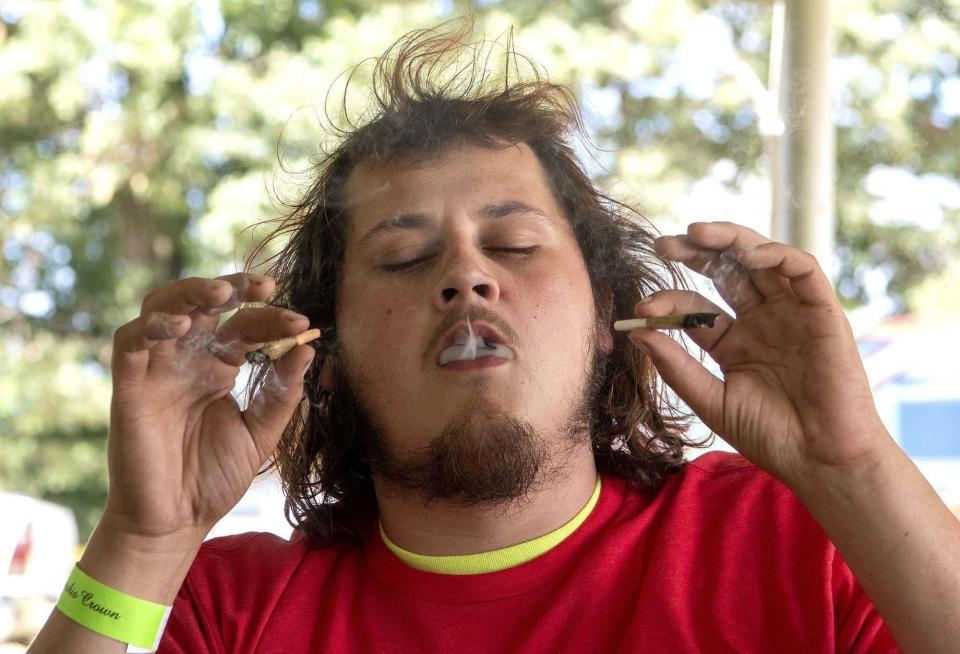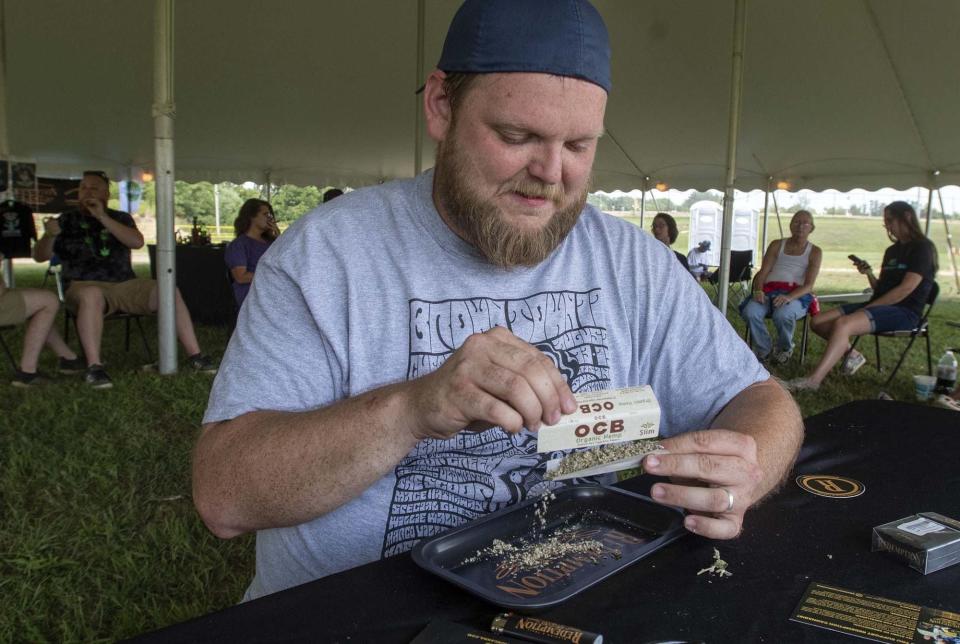2024 session sees renewed push for marijuana legalization at Indiana Statehouse
Indiana Democrats and some Republicans will once again seek to pass legislation legalizing marijuana during the 2024 legislative session, which begins Monday.
Past attempts at liberalizing Indiana’s marijuana laws have proved fruitless. During last year’s legislative session, more than a dozen bills that would have loosened restrictions on the drug to varying degrees — from legalizing adult recreational use or medical use to decriminalizing possession of small amounts — all failed in the Statehouse, where Republicans hold a supermajority in both chambers.
Cannabis is one issue where Indiana has set itself apart from its neighbors. Michigan and Illinois legalized recreational marijuana in 2018 and 2020, respectively. Ohio, where Republicans control the governor’s mansion and both chambers of the state Legislature, became the latest state to join them in November. So far, 24 states have legalized recreational marijuana and a majority of Americans now live in a state where cannabis can be accessed legally. The Hoosier state is one of just 12 holdouts that allow neither medical nor recreational cannabis use.
Indiana state Sen. Rodney Pol, a Chesterton Democrat, hopes to change that. He told the Post-Tribune that he is optimistic that his bill — which would legalize the use of cannabis by adults over 21 and anyone with a serious medical condition as designated by a physician — will pass.
The legislation would create a state level cannabis commission to oversee, implement, and enforce regulations on cannabis products grown and sold in the state. Marijuana-related products, including CBD, Delta-8 and Delta-9 products, can be legally sold in Indiana, but they are not overseen by a state regulatory body.
In November, Pol participated in a meeting of the Interim Study Committee on Commerce and Economic Development, which heard six hours of testimony related to marijuana legalization’s potential impacts from medical and legal experts.
“It was a great conversation,” he said, though the committee ultimately did not arrive at any recommendations for the 2024 session. “I thought there was a lot of good information that was presented.”
Pol pointed to recent moves by the White House toward a more liberal stance on marijuana, which remains federally illegal, as cause for hope. In October of 2022, President Joe Biden announced a pardon of all prior federal offenses for simple possession of marijuana and urged governors to follow suit at the state level. Indiana Gov. Eric Holcomb has indicated that he would not do so unless federal cannabis laws change. Biden also directed the secretary of Health and Human Services and the attorney general to begin a review of how marijuana is scheduled under federal law.
The federal government currently classifies cannabis in Schedule I of the Controlled Substances Act, a designation reserved for the most dangerous drugs that also includes LSD and heroin. On Aug. 29, HHS recommended to the Drug Enforcement Administration that marijuana be moved from Schedule I to Schedule III, the designation given to ketamine, anabolic steroids, and testosterone.
Reclassifying marijuana as a Schedule III drug would reduce the tax burden on marijuana businesses by allowing them to deduct business expenses associated with cannabis production from their taxable income. In December, five governors signed a letter to Biden urging him to ensure that the proposal goes into effect before the end of the year. Pol sees the still-looming possibility of rescheduling as “one of the biggest winds at our back” for state-level legalization advocates.
“That tears away yet another one of the barriers that we continuously hear about at the Statehouse,” he said. “As time has moved on, all of the factors have really been in favor of moving toward legalization.”
Pol’s legislation, Senate Bill 99, was referred to the Senate Committee on Commerce and Technology, along with a similar bill authored by Democratic state Sen. David Niezgodski, of South Bend, and a medical-only cannabis bill authored by Democratic state Sen. Greg Taylor, of Indianapolis.
Another medical cannabis bill, authored by state Rep. Jim Lucas, a Seymour Republican, was referred to the House Committee on Public Health. Lucas, unlike many of his GOP colleagues, has been a consistent advocate for loosening cannabis laws and has introduced medical marijuana and decriminalization legislation in past sessions.
Lucas believes that the 2024 session will “more than likely not” see movement on cannabis legalization.
“That’s just because of leadership,” he told the Post-Tribune. “They keep kicking the can down the road.”
Like Pol, Lucas supports the legalization and regulation of adult use cannabis. He has offered more modest proposals so far as a matter of political expediency.
“Right now, to think that we are controlling it is an insult to all rational, logical thinking human beings out there because we’re not,” he said. “You can get it in any middle school or prison.”
Medical marijuana is, to Lucas, the bare minimum. He pointed to the support of veterans groups like the American Legion, which in 2016 adopted a resolution urging the DEA “to license privately funded medical marijuana production operations in the United States to enable safe and efficient cannabis drug development research” and to remove the drug from Schedule I.
Neither Republican state Sen. Brian Buchanan, of Lebanon, who chairs the Commerce and Technology Committee, nor ranking member Eric Koch, a Bedford Republican, returned a request for comment.
Former state Sen. Karen Tallian, an Ogden Dunes Democtar, who was succeeded by Pol in her 4th District seat after she resigned midterm in 2021, was a longtime supporter of cannabis legalization. Her decision to leave the Senate, she said at the time, was motivated by a sense of frustration with Statehouse Republicans’ stonewalling of liberal action items.
“Some time in the future, maybe near, maybe nearer than you think, Indiana will join the rest of the country and address the marijuana question,” Tallian, a 16-year State House veteran said on the Senate floor. “And when you do, think of me.”
_____



